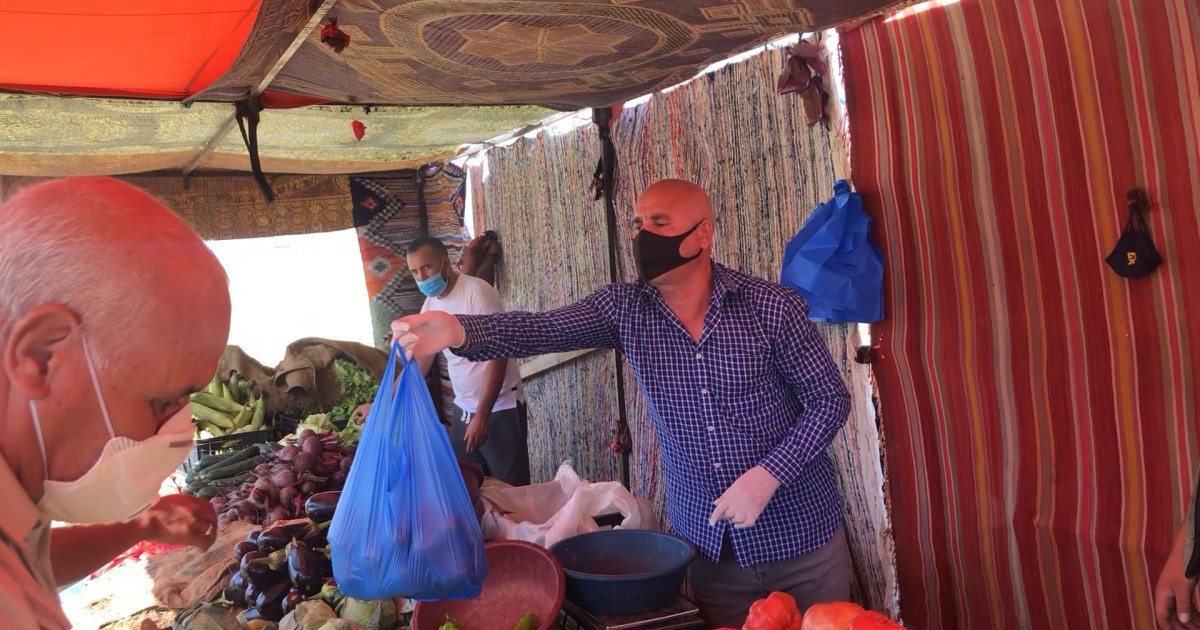At the entrance to the city of Bordj Bou Arreridj, 300 km east of the Algerian capital, the well-known writer and journalist, Abdel-Razzaq Bouabba, is setting the table of vegetables that he chooses as a commercial project that pours his daily revenues to finance his new cultural child, the "Fassila Association for Cultural Creativity".
He did not care much about the insistence that he sees in his selection of this vegetable table as an "ill-considered rebellion against his reality as a novelist and a media."
Financial independence
"I have seen that the vegetable table is in harmony with the nature of our popular and voluntary project, as it is considered in the Algerian people's imagination a symbol of self-reliance and the achievement of daily sustenance with honor," he says in his statement to Al-Jazeera Net.
The award-winning writer, along the lines of "Beirut 39 ″" and "The Arab Pioneer Shield" and supervising the launch of five literary awards in his country, continues, "It is urgent that we move in the context of changing the reality imposed by certain circumstances that kept man from his mind and made him a slave to his stomach."
Expatriates head towards the writer's table, wading with him in questions that they are not used to often taking into account their daily needs, asking him about his cultural project, and interacting with the seller of "educated vegetables", until one of them described the project as a "literacy table."
"I wanted, through the project, to say that there is someone who uses trade in materials related to stomachs to finance projects related to minds, in light of the spread of the phenomenon of converting the spaces of the book into food spaces due to the consumerism of society," he added.
He writes a book in his notebook, which is devoted to him from one customer to another, the pages of his novel work, which will transmit his new experience he is running, puts the file of the cultural association he recently created on his right, and writes what might be incurred today’s income from "needs" needs, and calls one of the members of the association to inform him to solve the problem.
"Revenge" from the ministry
Many of the writers of the writer Abdel-Razzaq Boukaba believe that his choice of this solution to finance his cultural project is "revenge on the Ministry of Culture", while he replies by saying "the cultural act that we adopt is far from revenge."
He continues, "We will submit a file to the Ministry of Culture to finance the project, but considering that our activity has already started, and since the members of the" Fasila "association spend most of their time outside their homes to move it, it is therefore impossible for our very fast pace to be in line with the slow official procedures that we hope will accelerate in the coming days."
On the embarrassment that some see as a writer and media practitioner selling vegetables at a table, Boukabba says, "The intellectual who does not face the street and remains hidden behind the screens to make ready-made and canned judgments, is the one who should be ashamed."
He continues, "who enjoys - in the government sector - a fixed monthly salary and privileges inside and outside the law without having a tangible impact in the field, who should be ashamed, while the vegetable table is a source of pride for me."
Abdel-Razzaq Boukaba considers that this vegetable table made him "worthy of the title of cultural activist who believes in feasibility rather than complaint", saying, "The vegetable table may stop temporarily and may falter and may develop to a different horizon, but it remains an idea and a pattern of thinking and protest."
He concluded that "the elite should recover itself from this situation by searching for additional or final alternative sources of funding, because it is shameful for us not to have a single cultural project that operates away from government support and provides tax to the public treasury rather than absorbing it."

